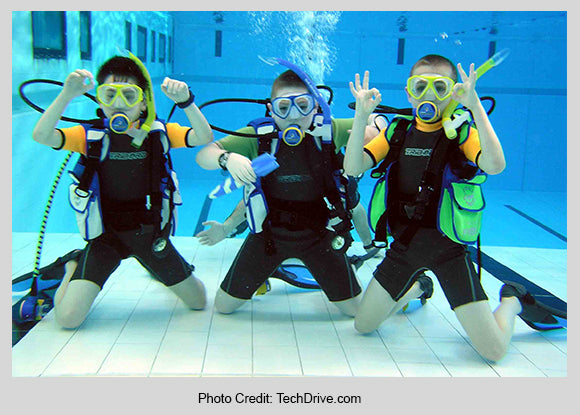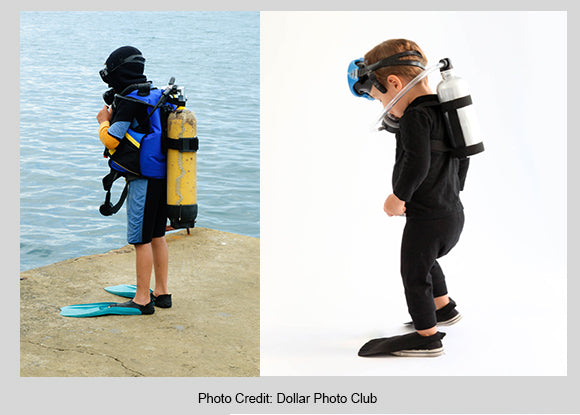How Old Do You Have To Be To Scuba Dive? Well, It’s A Tricky Answer!
For most of us, getting into scuba diving was a journey taken later on in life. But in the modern world where most children are discovering new passions on YouTube from when they can walk - how old do they have to be to scuba dive?
The short answer - you can start scuba diving at the age of eight years old. Most scuba diving certification institutions offer tailored lessons for young and eager divers, but there are some big Ts and Cs with this arrangement.

When you think of eight-year-olds in general, most are just coming to terms with simple mathematical concepts. As a generalization, they aren't a group of tiny peeps you'd call "cool, calm, and collected" - attributes you'd want in a diver.
But some children are just more mature than others. Also, it’s worth noting that this age limited is still hotly debated within the diving community.
The Concerns About Diving At A Young Age
When thinking about the right age for a young person to start scuba diving, there are valid questions that need addressing.
The biggest concern is that diving has an adverse effect on a child's body and that they may not be strong enough to carry the equipment. A pre-teen body may not be physically ready for such stress.

This leads to many scuba diving instructors arguing that teaching a youngster to dive is too risky.
The diving realm is a stressful enough environment for certain adults. To be a certified scuba diver you need to possess a certain level of maturity, confidence, and be able to make decisions under stress. You must be sensible about how far to push your body.
But those concerns aside, at the end of the day, your kid become a diver depends on just three things:
- Do you (as the parent) consent?
- Are they (at least) eight years old?
- Can they pass the pass the course?
The Upside To Diving At A Young Age
We've covered the concerns, but what is the argument for kids scuba diving?
Well, starting at an early age will help them gain an appreciation for the oceans and nature.

The discipline and skills required will also help their development and provide them with tools that could be incredibly beneficial in life.
Another more depressing factor to consider is that the oceans are being depleted and certain sights underwater could be gone in the next ten years.
So, there’s an argument that the sooner you can get your children under the waves, the more they’ll be able to see.
What Diving Courses Are Available For 8 - 11-Year-Olds?
At this age, they will be confined to a pool. Don’t expect, or promise them, that they’ll be like the next Jacques Cousteau – no – they’ll be learning the very basics.

Think of it this way. When you were teaching your child to ride a bicycle, you put training wheels on their bike before pushing them off for the first time. That adventure also took place in a backyard.
Diving requires greater caution.
The shortest course they can do would be the simple, "Try Diving" course in the pool with the instructor. They'll perform the basics to keep themselves safe under the water, like ear equalization and hand signalling. This typically takes about a day.
Then those who’ve been bitten by the diving bug will be able to enroll in an in-depth course over a few months. They will cover the same lessons as the adults, completing the entry certificate, but over a more extended period.
For young divers, more time will be allocated to lessons like keeping the mask clear, and there will be multiple lessons on the buoyancy compensator. The language will also be more straightforward with tailored, child-friendly images.
Once qualified, they’ll still be confined to a pool and can only dive 12 feet maximum - assuming the pool is deep enough.
What Diving Courses Are Available For 12 - 15-Year-Olds?
Around the cusp of teenagehood, your young adult will be a little more mature, but very emotional, because, hormones.
But diving might be a way to channel all that energy (and angst). From 12 years old they will be able to apply for the junior scuba diving certification.
Most scuba certification organizations offer open water qualifications for these junior divers, as well as the other courses.

But this isn’t an easy task as they will be required to complete the standard adult course but will still need adult supervision at all times.
While they can opt for more specialized qualifications, this won’t entitle them to special treatment. Young adults can not lead dives or be assistants for scuba instructors.
Junior divers are also strictly limited to a dive depth of 60 feet. Some organizations will push it a bit deeper to 72 feet, but that’s solely dependent on which provider you choose.
So, right now, you might be asking yourself a few questions, like:
“Why waste their time doing a rescue diver certification? And why fork out a boatload of cash for something they can’t use?”
Well, all certification acquired by your clever whipper-snapper can be automatically upgraded to the adult status after the age of 15 - without any additional training.
Final Thoughts On The Best Age To Scuba Dive
There are pros and cons to your young one's diving at a young age. It's important not to let your passion push your kid into starting before they are ready. They will grow up fast enough; there is plenty of time to join them on underwater adventures.
If you do feel your child is ready, then know that the diving certifications and training for kids are well established and will ensure that they learn at a pace they can handle.
Find the right option, and if your young one is dedicated and mature, then they might be well on their way to becoming certified divers.

